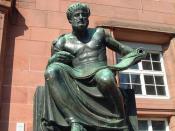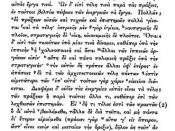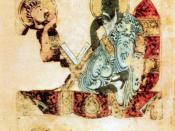Evaluate Aristotle's argument(s) for his claim that happiness (eudaimonia) is the goal of human life.
In evaluating Aristotle's arguments for his claim that happiness (eudaimonia) is the goal of human life, I believe it is important to recognise the true problem at hand, which can be seen to be, does Aristotle succeed arguing that happiness (eudaimonia) is the goal of human life? I believe that overall Aristotle does not succeed in arguing this point but that he does provide some very sound arguments in defending some of his opinions.
Aristotle believed that "all human activities aim at some good" and for this reason, he initially defines the good as "that at which all things aim". For example, medicine seeks health just like learning seeks knowledge. Both health and knowledge are thought to be good but at the same time they are also seen to be ends. Aristotle viewed ends as being either activities or the products that are produced by the activities e.g.
the activity of flute playing is an end while a house is also seen to be an end as it is the product of the activity of house-building. But some ends are clearly subordinate to others. Aristotle used the example of Bridle making, which falls under the art of riding, along with every other military action, which all fall under the art of strategy. Clearly there is a master art for which all others are subordinate to, and so, "it is for the sake of the former that the latter are pursued". In other words, there is an end which man desires purely for its own sake with everything else being desired for the sake of this. This final end, Aristotle called the Chief Good. Aristotle thought that if we knew what this Chief Good was, then...


